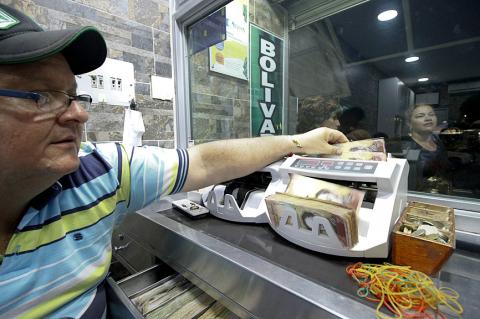Venezuela, mired in an economic crisis and facing the world’s highest inflation, will pull its largest bill — the 100 bolivar, worth US$0.02 on the black market — from circulation this week ahead of introducing new higher-value notes, Venezuelan President Nicolas Maduro said on Sunday.
The surprise move, announced by Maduro during an hours-long speech, is likely to worsen a cash crunch in the country.
Maduro said the 100 bolivar bill is to be taken out of circulation tomorrow and Venezuelans will have 10 days after that to exchange those notes at the central bank.

Photo: AFP
Critics slammed the move, which Maduro said was needed to combat contraband of the bills at the volatile Colombia-Venezuela border, as economically nonsensical, adding that there would be no way to swap all the 100-bolivar bills in circulation in the time the president has allotted.
Central bank data showed that last month, there were more than 6 billion 100-bolivar bills in circulation, 48 percent of all bills and coins.
Authorities on Thursday are due to start releasing six new notes and three new coins, the largest of which will be worth 20,000 bolivars, less than US$5 on the streets.
No official inflation data is available for this year though many economists see it in triple digits. Economic consultancy Ecoanalitica estimates annual inflation this year at more than 500 percent.
The oil-producing nation’s bolivar currency has fallen 55 percent against the US dollar on the black market in the last month.
“When ineptitude governs! Who would possibly think of doing something like this in December amid all our problems?” two-time opposition presidential candidate Henrique Capriles wrote on Twitter, referring to the upcoming Christmas holiday.
Maduro previously has said that organized crime networks at the Colombia-Venezuela border buy up Venezuelan notes to buy subsidized Venezuelan goods and sell them for vast profits in Colombia.
While smuggling of this sort is an issue at the border, it cannot account for nationwide shortages of the most basic goods from food to medicine, which have left millions hungry and doctors crying out for help.
“I have decided to take out of circulation bills of 100 bolivars in the next 72 hours,” Maduro said. “We must keep beating the mafias.”
Paying a restaurant or supermarket bill without a debit or credit card can often require a backpack full of cash. However, getting cash in recent months has proven difficult and the nation’s credit-card machines have recently suffered problems, leaving many businesses asking customers to pay by bank transfer.
Strict currency controls introduced in 2003 that pegged the bolivar to the US dollar, coupled with heavy reliance on oil, are seen as the root of the crisis by most economists. Maduro has blamed an “economic war” being waged against his government by the opposition and the US.
Money supply, the sum of cash and checking deposits, as well as savings and other “near money” deposits, was up a staggering 19 percent in the three weeks to Dec. 2 and the curve has been exponential since Maduro’s predecessor Hugo Chavez came to power in 1999.

SEEKING CLARITY: Washington should not adopt measures that create uncertainties for ‘existing semiconductor investments,’ TSMC said referring to its US$165 billion in the US Taiwan Semiconductor Manufacturing Co (TSMC, 台積電) told the US that any future tariffs on Taiwanese semiconductors could reduce demand for chips and derail its pledge to increase its investment in Arizona. “New import restrictions could jeopardize current US leadership in the competitive technology industry and create uncertainties for many committed semiconductor capital projects in the US, including TSMC Arizona’s significant investment plan in Phoenix,” the chipmaker wrote in a letter to the US Department of Commerce. TSMC issued the warning in response to a solicitation for comments by the department on a possible tariff on semiconductor imports by US President Donald Trump’s

The government has launched a three-pronged strategy to attract local and international talent, aiming to position Taiwan as a new global hub following Nvidia Corp’s announcement that it has chosen Taipei as the site of its Taiwan headquarters. Nvidia cofounder and CEO Jensen Huang (黃仁勳) on Monday last week announced during his keynote speech at the Computex trade show in Taipei that the Nvidia Constellation, the company’s planned Taiwan headquarters, would be located in the Beitou-Shilin Technology Park (北投士林科技園區) in Taipei. Huang’s decision to establish a base in Taiwan is “primarily due to Taiwan’s talent pool and its strength in the semiconductor

Industrial production expanded 22.31 percent annually last month to 107.51, as increases in demand for high-performance computing (HPC) and artificial intelligence (AI) applications drove demand for locally-made chips and components. The manufacturing production index climbed 23.68 percent year-on-year to 108.37, marking the 14th consecutive month of increase, the Ministry of Economic Affairs said. In the first four months of this year, industrial and manufacturing production indices expanded 14.31 percent and 15.22 percent year-on-year, ministry data showed. The growth momentum is to extend into this month, with the manufacturing production index expected to rise between 11 percent and 15.1 percent annually, Department of Statistics

An earnings report from semiconductor giant and artificial intelligence (AI) bellwether Nvidia Corp takes center stage for Wall Street this week, as stocks hit a speed bump of worries over US federal deficits driving up Treasury yields. US equities pulled back last week after a torrid rally, as investors turned their attention to tax and spending legislation poised to swell the US government’s US$36 trillion in debt. Long-dated US Treasury yields rose amid the fiscal worries, with the 30-year yield topping 5 percent and hitting its highest level since late 2023. Stocks were dealt another blow on Friday when US President Donald